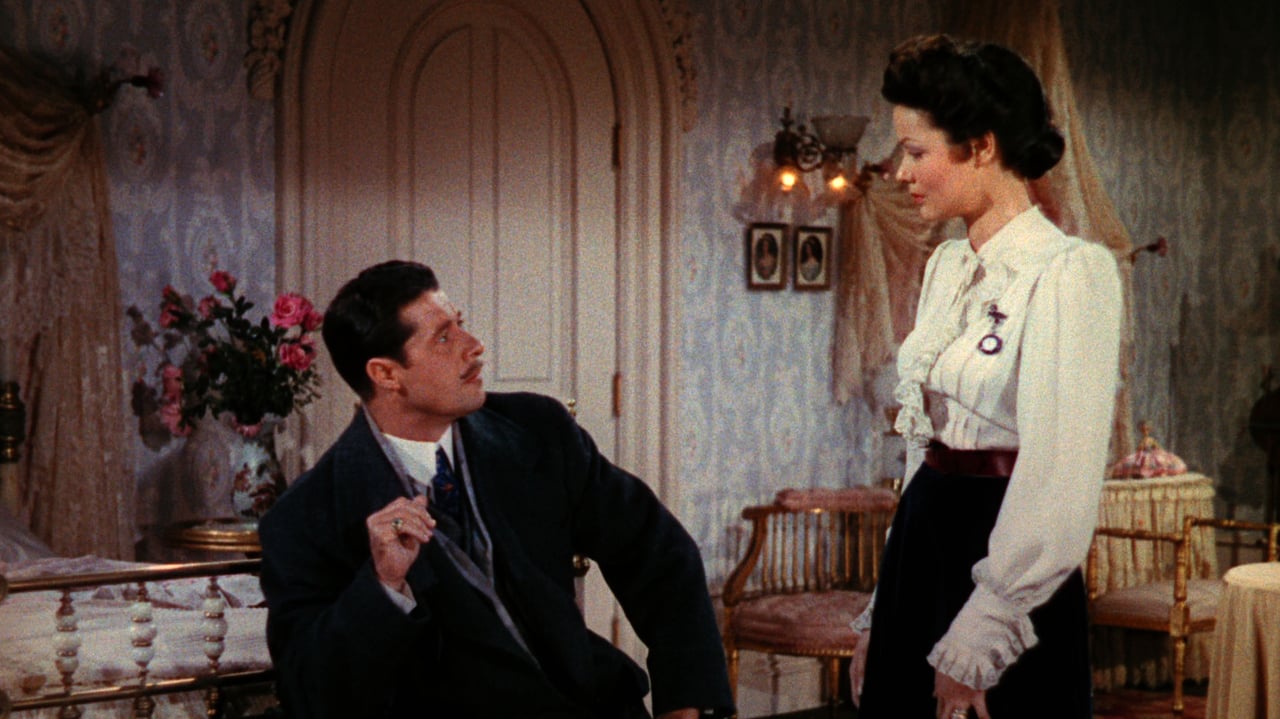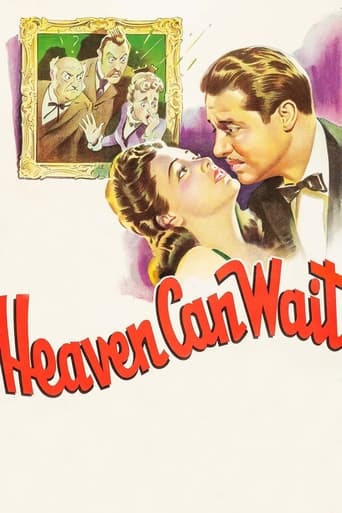



Tied for the best movie I have ever seen
Instead, you get a movie that's enjoyable enough, but leaves you feeling like it could have been much, much more.
View MoreAmazing worth wacthing. So good. Biased but well made with many good points.
View MoreThere are moments that feel comical, some horrific, and some downright inspiring but the tonal shifts hardly matter as the end results come to a film that's perfect for this time.
View MoreUnder its full-blown Technicolor aureole, HEAVEN CAN WAIT becomes the one and only oddity in Lubitsch's canon, it is also a three-time Oscar nominee including BEST PICTURE and BEST DIRECTOR, adapted from Leslie Bush-Fekete's stage play BIRTHDAY. Indeed, this dissection of a boulevardier's seventy-year life orbit is demarcated through his birthdays. Arriving at the entrance of Hell (grandiloquently designed futuristic tableau), the freshly-departed Henry Van Cleve (Ameche) meets the Hades the Excellency (Cregar), and takes for granted that he would go to hell, but His Excellency suggests Henry to chronicle his entire life to him, so that he can make the judgement whether Henry is qualified or otherwise. Before that, a flashy but over- the-hill old acquaintance of Henry, Ms. Edna Craig (un uncredited Bates), has be squarely sent to the infernal by the eyeball-rolling Excellency, after all, it is difficult to bypass the annoyance that the picture has been inexorably sullied by the double gender standard of its time. Anyway, that is only a sidebar note. Henry is born with a silver spoon in his mouth, the only child of Randolph (Calhern) and Bertha (Byington), his parents are stuffy and prissy, but Henry takes after his grandfather Hugo Van Cleve (Coburn), a self-made millionaire. From his prepubescent years, he has already acquired a natural knack of wooing girls, garnished with a little influence from a snazzy French maid (Hasso, a resplendent accompaniment), a rake is officially born. It is at his 26-year-old birthday party, a chance-meeting of the girl of his dream, Martha Strable (Tierney), the fiancée of Henry's pedantic cousin Albert (Joslyn), Henry wastes no time to propose an elopement together which sweeps Martha off her feet, and unceremoniously scandalizes the rest of the family and on-lookers (maybe not grandpa). Ten years later, everything seems to remain status quo (although Randolph has exited the scene at this point), Henry is 36-year-old, he and Martha have a son Jack, grandpa is still sprightly, and later will assist Henry to win back Martha for a second time at the Strables' in Kansas, where Lubitsch cooks up a splendidly humorous skit between Martha's warring parents (Pallette and Main) with their butler Jasper (Muse) as a brilliant intermediary. The good-natured Martha will take her bow after their 25th wedding anniversary, leaves Henry to the adult Jack (Andrews), who is gallant enough to take over the family business while Henry, as years go by, never grows out of his man-child carapace, not even when he is in extemis, just after celebrating his 70th birthday, all he wants is a sultry nurse to send him down to the road (his exit music is tellingly, Franz Lehar's MERRY WIDOW WALTZ), only to be denied by the over-courtly Excellency, heaven can wait, after all, since one's raffish behavior alone doesn't guarantee to descend into hellhole, it is the aggregate that really counts. Coyly leaving all of Henry's dalliances off-screen, Lubitsch's touch only focuses on his more meritorious facets such as his well-maintained marriage with Martha, and his cautious move to sever off the possible relationship between a money-seeking showgirl and Jack. Don Ameche's sublimely debonair affinity perfectly accentuates Henry's salutary charm, which merely makes his self-effacing lamenting on his senility and growing pouch sound too mawkish to concur (the make- up department is not really helping either). Gene Tierney, first-billed for her star power rather than her screen time, is four-square enough to exemplify the image of an immaculate wife with Charles Coburn naughtily playing harmless tricks and being sagacious in the side lane. Still, HEAVEN CAN WAIT, in the face of its joie-de-vivre grandstanding, deep down, there is a tangible twinge of loss and sudden departures hits audience harder than it lets on, through the ellipsis of characters when time jumps, ineffably tempers the life-affirming tale with a knowing poignancy, gladly so, maestro Lubitsch never disappoints us.
View MoreHave you ever noticed while watching your favorite films, that in Hollywood they sort of discretely hide the ages of older characters? When you think about it, many motion pictures have quite a few older performers in the most important roles (usually playing much younger). But Ernst Lubitsch's 1943 masterpiece, Heaven Can Wait, is different. It rewrites the rule book on movie star aging and goes against the norm. There are many performers in this picture that are well above forty. And what's so great is that Lubitsch lets them act their own natural age. Take, for example, Charles Coburn. He happens to play a character quite a bit older than he is in real life! And the movie is much richer for it.
View MoreBased on a play by Leslie Bush-Fekete, Ernst Lubitsch's "Heaven Can Wait" tells the tale of Henry Van Cleve (Don Ameche), a predatory playboy who has a series of adulterous affairs."Heaven" opens in hell, where a mustachioed Satan is confronted by a now deceased Henry. Henry, who states that he wishes to avoid his wife in heaven, begs the Master of Darkness to "keep him downstairs", trapped in hell and so away from his wife's judgemental gaze. To convince the devil, Henry proceeds to recount his own life-story (told to us via flashback), hoping that an account of his collective sins will convince all and sundry that he is in fact unsuitable for heaven. The film is typically read as a "touching" and "funny" portrait of marriage and its difficulties, but perhaps also has another aspect: the smooth-talking Henry is conning Satan, presenting a ridiculously biased tale in order to excuse his own chauvinism.Stiff and slow, and with an unnecessary framing device, "Heaven" can't compete with Lubitsch's better films ("The Shop Around The Corner", "Trouble in Paradise", "To Be Or Not To Be" etc). It was Lubitsch's most profitable picture. Some regard it as a masterpiece.5/10 - See "The Shop Around The Corner".
View MoreDon Ameche's Henry has gone to hell. No, this isn't the hell of fire and damnation. Not yet. That will have to wait. He's meeting with the head man (Laird Cregar), who looks like our rendition of Satan, but is suave, cool, and willing to listen. That is until a brief acquaintance's of Ameche's comes into the room unwelcome. With the push of a button, Cregar takes care of this pest (played delightfully by the grand Florence Bates) and Ameche is able to tell his story of why he thinks he's in hell.Young Henry was fought over by women from the day he was born. His mother (Spring Byington) and paternal grandmother (Clara Blandick) each wanted to smother him with love without the other around, and as he grew up (teenager Dickie Moore), that continued. A French nurse shows him about life while his prim and proper cousin gets more and more prissy, growing up to be Ameche's rival (Allyn Joslyn). Ameche does further damage by walking off (or really running off) with the pretty Gene Tierney (engaged to Joslyn), humorously sired by Marjorie Main and Eugene Palette, playing a wealthy country bumpkin couple who hate each other. All the while, Ameche gains the wisdom of life and his sense of humor from his delightful grandfather (Charles Coburn) who helps him win Tierney back (from Joslyn again!) when their marriage goes sour. As Ameche ages, he finds himself at the beck and call of the next generation, never loosing his attraction for younger members of the opposite sex, and prepares for his entrance into the next world, certain he has made a failure of his life.The Dante's Inferno feel of this slightly black comedy sets it up with a lot of questions. Henry only ends up in hell because he feels he belongs there, having been told to go there a number of times, and being told by grandpa that if he came to heaven, grandpa would be waiting for him with a baseball bat. Of course, grandpa was just joking, later seen on a spree with Ameche to get his beautiful wife back.There is a delightful sophisticated look to this Technicolor comedy with everybody dressed to the nines and reciting a lot of humorous dialog. If Coburn hadn't won the Oscar for the same year's "The More The Merrier", he would have been a front-runner for this one, his old codger a forerunner to his delightful "Piggy" from "Gentleman Prefer Blondes". The scene at Main and Palette's country home hysterically shows them badgering the butler, Jasper, to speak for each of them, fighting over Sunday's comics and Main enjoying spoiling one of the weekly serials as she makes sure Palette overhears each thing she tells Jasper. Every detail of this film sparkles. For example, at a family reunion, there is a delightful impromptuness of the family portrait with certain members being photographed in embarrassing poses, and then towards the end, the two different looking nurses who pass by each other offscreen, greet each other, each one of them looking into the hall mirror with different reflections staring back at them.Ameche is perfectly cast, playing a slightly younger variation of William Powell and enjoying every moment he is on screen. Tierney, not yet the siren of "Laura" or "Leave Her to Heaven", is a vision of breathtaking beauty and seems to be parodying her crimson goddess role. The subject of death is presented gently, and the transition from one world to another filled with such peace, that there is no macabre detailing to the theme, just a simple passing from one world to the next, as if each of these aging characters had simply left town.
View More